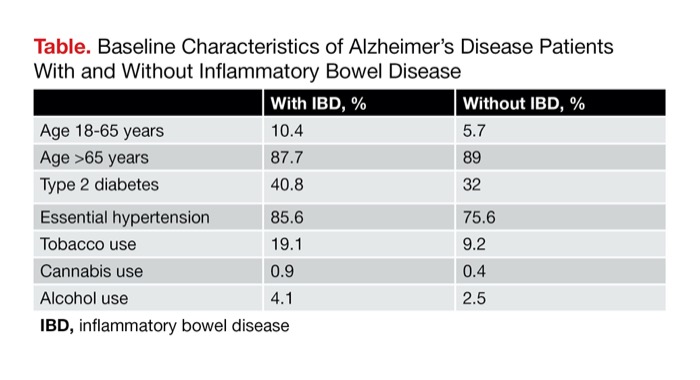A growing body of evidence is pointing to an increased risk for dementia among people with inflammatory bowel disease.
An epidemiological study presented at the 2021 virtual Digestive Disease Week found patients with IBD were more than twice as likely as the general patient population to develop Alzheimer’s disease, marking the second report to appear this year link the two conditions. Encouragingly, researchers said, treatment with anti–tumor necrosis factor (TNF) agents and azathioprine was associated with a reduced risk for Alzheimer’s disease in IBD patients.
“If these findings are corroborated with future studies, controlling inflammation early on after IBD diagnosis may have the added benefit of protecting against future dementia,” said Jenny Sauk, MD, the director of clinical care at the UCLA Center for Inflammatory Bowel Diseases, who was not involved in the research. However, she said the research showed an association, but not causation. “This study is intriguing and highlights an important topic that deserves further investigation,” she said.
Manik Aggarwal, MD, an internal medicine resident at Cleveland Clinic, in Cleveland, and the lead researcher on the latest study, said chronic inflammation and changes in the intestinal microbiome have recently been recognized to play a role in the pathogenesis of Alzheimer’s disease.
For example, a study published this year in the Journal of Alzheimer’s Disease (2021;79[3]:1235-1255) found that mice with laboratory-induced colitis had increased levels of amyloid-beta plaques—a pathologic hallmark of Alzheimer’s disease in humans—and microglial immunoreactivity, which is a mechanism thought to underlie Alzheimer’s disease.
In addition, a Taiwanese study published this year found a higher prevalence of Alzheimer’s disease in patients with IBD in that country (Gut 2021;70:85-91). Those investigators examined the Taiwanese National Health Insurance Research Database, including data from 1,742 IBD patients who were at least 45 years of age and 17,420 controls. They found that 5.5% of IBD patients had a diagnosis of dementia, compared with 1.4% of controls. The greatest risk for dementia was for Alzheimer’s disease. Patients with IBD were diagnosed with dementia earlier, on average, than those without cognitive problems (age 76 vs. 83 years).
| Table. Baseline Characteristics of Alzheimer’s Disease Patients With and Without Inflammatory Bowel Disease | ||
| With IBD, % | Without IBD, % | |
|---|---|---|
| Age 18-65 years | 10.4 | 5.7 |
| Age >65 years | 87.7 | 89 |
| Type 2 diabetes | 40.8 | 32 |
| Essential hypertension | 85.6 | 75.6 |
| Tobacco use | 19.1 | 9.2 |
| Cannabis use | 0.9 | 0.4 |
| Alcohol use | 4.1 | 2.5 |
| IBD, inflammatory bowel disease | ||
For the new study (abstract Sa514), Dr. Aggarwal’s team analyzed electronic health record data from 26 health care systems in the United States between 1999 and 2019, covering roughly 73 million people and 342,720 patients with IBD (Table).
They found that 1.55% of patients with IBD had received a diagnosis of Alzheimer’s disease at least three months after their bowel diagnosis, compared with 0.98% of the general study population.
Multivariate analysis put the risk for Alzheimer’s disease in the IBD population at more than twice that of the general population (odds ratio [OR], 2.3; 95% CI, 2.1-2.51; P<0.05). Patients with Crohn’s disease had a higher odds of developing Alzheimer’s disease (adjusted OR [aOR], 3.33; 95% CI, 3.25-3.42; P<0.0001) than those with ulcerative colitis (aOR, 1.09; 95% CI, 1.06-1.14; P<0.0001).
The investigators also discovered that use of anti-TNF agents was associated with significantly lower odds of having Alzheimer’s disease among Crohn’s disease patients (OR, 0.37; 95% CI, 0.35-0.39; P<0.0001).
Dr. Aggarwal said the results need to be confirmed in other cohorts, but the findings indicate that clinicians should screen IBD patients—particularly those with Crohn’s disease—for early Alzheimer’s. Moreover, the findings highlight that effective IBD treatment could help prevent Alzheimer’s disease in people with IBD.
“Our current treatment paradigms support early control of active inflammation to prevent long-term disease complications, and these findings suggest that Alzheimer’s disease may be one of these complications, particularly in Crohn’s disease,” Dr. Aggarwal said.
He called for greater understanding of the causes of Alzheimer’s disease in IBD patients and tools to screen for cognitive diseases in IBD patients.
—David Wild
Drs. Sauk and Aggarwal reported no relevant financial disclosures.
This article is from the September 2021 print issue.



